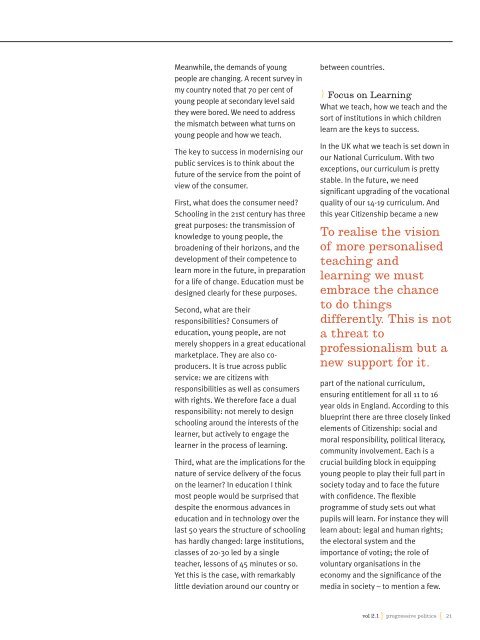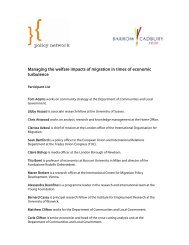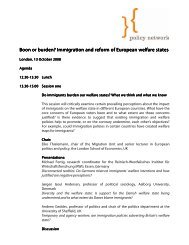Education, Heartbeat of a Nation - Policy Network
Education, Heartbeat of a Nation - Policy Network
Education, Heartbeat of a Nation - Policy Network
Create successful ePaper yourself
Turn your PDF publications into a flip-book with our unique Google optimized e-Paper software.
Meanwhile, the demands <strong>of</strong> youngpeople are changing. A recent survey inmy country noted that 70 per cent <strong>of</strong>young people at secondary level saidthey were bored. We need to addressthe mismatch between what turns onyoung people and how we teach.The key to success in modernising ourpublic services is to think about thefuture <strong>of</strong> the service from the point <strong>of</strong>view <strong>of</strong> the consumer.First, what does the consumer need?Schooling in the 21st century has threegreat purposes: the transmission <strong>of</strong>knowledge to young people, thebroadening <strong>of</strong> their horizons, and thedevelopment <strong>of</strong> their competence tolearn more in the future, in preparationfor a life <strong>of</strong> change. <strong>Education</strong> must bedesigned clearly for these purposes.Second, what are theirresponsibilities? Consumers <strong>of</strong>education, young people, are notmerely shoppers in a great educationalmarketplace. They are also coproducers.It is true across publicservice: we are citizens withresponsibilities as well as consumerswith rights. We therefore face a dualresponsibility: not merely to designschooling around the interests <strong>of</strong> thelearner, but actively to engage thelearner in the process <strong>of</strong> learning.Third, what are the implications for thenature <strong>of</strong> service delivery <strong>of</strong> the focuson the learner? In education I thinkmost people would be surprised thatdespite the enormous advances ineducation and in technology over thelast 50 years the structure <strong>of</strong> schoolinghas hardly changed: large institutions,classes <strong>of</strong> 20-30 led by a singleteacher, lessons <strong>of</strong> 45 minutes or so.Yet this is the case, with remarkablylittle deviation around our country orbetween countries.Focus on LearningWhat we teach, how we teach and thesort <strong>of</strong> institutions in which childrenlearn are the keys to success.In the UK what we teach is set down inour <strong>Nation</strong>al Curriculum. With twoexceptions, our curriculum is prettystable. In the future, we needsignificant upgrading <strong>of</strong> the vocationalquality <strong>of</strong> our 14-19 curriculum. Andthis year Citizenship became a newTo realise the vision<strong>of</strong> more personalisedteaching andlearning we mustembrace the chanceto do thingsdifferently. This is nota threat topr<strong>of</strong>essionalism but anew support for it.part <strong>of</strong> the national curriculum,ensuring entitlement for all 11 to 16year olds in England. According to thisblueprint there are three closely linkedelements <strong>of</strong> Citizenship: social andmoral responsibility, political literacy,community involvement. Each is acrucial building block in equippingyoung people to play their full part insociety today and to face the futurewith confidence. The flexibleprogramme <strong>of</strong> study sets out whatpupils will learn. For instance they willlearn about: legal and human rights;the electoral system and theimportance <strong>of</strong> voting; the role <strong>of</strong>voluntary organisations in theeconomy and the significance <strong>of</strong> themedia in society – to mention a few.vol 2.1 progressive politics 21






